As it happened: Day three of election petition
The Supreme Court on Wednesday heard the submissions of the first respondent (Yoweri Museveni) in an election petition by Amama Mbabazi.
At Supreme Court
Presented by Joseph Kizza
@joekizza
- Election petition hearing continued on Wednesday
- First respondent (Museveni) made his submissions
- Earlier on Tuesday, the petitioner made his submissions
- On Thursday, hearing continues, with the second respondent (Electoral Commission) making its submissions
|
7.00pm: COURT ADJOURNED
Court has been adjourned until Thursday morning. The session will start at 9.30am. 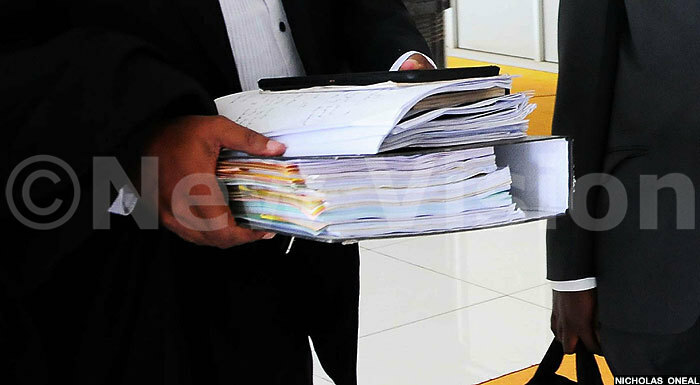
Time to close the files . . . for today. Good evening! |
6.57pm: Petition 'based on hope'
Byenkya concludes his submission by arguing that former Prime Minister Amama Mbabazi's petition is based purely on hope. He says that 10 million Ugandans voted on February 18 and elected their president. "The people spoke and we pray that you uphold their [voters'] decision."
6.50pm: Intimidation claims
On the chopper incident in Fort Portal claimed as intereference by the petitioner, Byenkya argues that Lt. Gen. Henry Tumukunde landed a helicopter at a field with no rally and with only a handful of people and so that does not constitute interference.
On the claim of intimidating deployment of soldiers and policemen in the city, Byenkya says that Ugandans are no longer afraid of the men in uniform.
"Ugandan police officers can easily be identified by their name and number on their uniform," Museveni's lawyer tells court, adding that none is identified in the petitioner's affidavits on intimidation.
Byenkya tells the Supreme Court that some witnesses say that they say soldiers but that they do not explain how their seeing them intimidated them. As such, he submits that such claims are vague.
6.40pm: Media coverage
On the allegations by the petitioner that Museveni received more favorable media coverage, translating into unfair media coverage on the part of the other seven presidential candidates, Byenkya says that the NRM leaders made his own coverage (of campigns) and disseminated it to media establishments.
The lawyer's argument is that candidates should give media content."Then you will have a case if they don't play [use] it."
He also argues that the first respondent was a very active campainger, adding that it is not a matter of the Electoral Commission to determin how much media coverage candidates should recive. It's the work of those particular media houses, submits the lawyer.
The petitioner singles out media houses UBC TV and New Vision for having given Museveni more airtime and space than the other candidates. In defence of, particularly UBC TV, Byenkya makes an argument that providing equal coverage to the presidential candidates would mean that the national broadcaster would have to buy equipment to cover all candidates. "Even those that take holidays", he quips.
Museveni's lawyer also argues that it makes more sense to cover a candidate with popular appeal as opposed to one who is less popular.
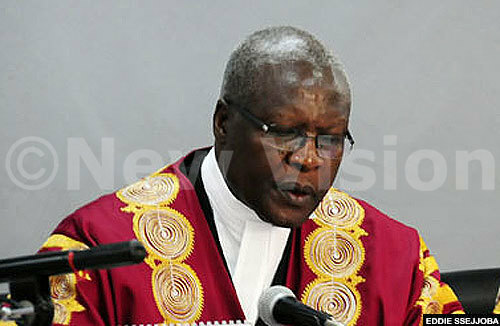
6.30pm: National ID
In the current petition, Mbabazi questions why the Electoral Commission did away with the voters' card and instead stuck with the national ID. In defence of the use of the national ID, Byenkya calls the national ID a "superior identification tool" that cancels out the "burden" of having to go an physically register to vote.
He argues that photos, too, are part of biometrics, adding that biometric technology has improved the national voters' register. He says that the use of biometrics is consistent with the law on grounds that it improved the national voters' register. The lawyer goes on to cite a Raila odinga case in Kenya and says the Kenya's Electoral Commission employed biometric technology and credited it for adding an additional layer of integrity.
6.20pm: Perfect register 'impossible'
On the issue of multiple voting, Byenkya says that Electoral Commission boss Eng. Badru Kiggundu, when he was cross-examined on the first day of the hearing on Monday, he said the problem of multiple voting had tremendously reduced.
He also goes on to say that a voters' register is prone to imperfections. "We can only always strive to make it better," he says, citing a previous case and also adding that it is vital to have a national voters' register that has integrity.
He says that lack of complaints in Amama Mbabazi's petition as regards multiple voting is proof that the issue was handled.
In the Mbabazi's petition, the former Prime Minister says that the retiring of the previous national voters' register was illegal and also points out that some names were missed in the new register.
In light of that argument, Byenkya cites a previous ruling from Chief Justice Bart Katureebe in which he says that the Supreme Court "found that the 2001 national voters' register was in shambles".
6.15pm: On 'wolf' comments
Byenkya further defends the first respondent, Yoweri Museveni, over the "wolf" statement. He argues that the right to campaign includes the right to criticise fellow opponents.
Mbabazi's petition is critical of Museveni's comments that he cannot allow the country to be ruled by "emishega" [wolves]. Byenkya says that it is acceptable to say that your rival cannot lead the country.
Byenkya makes reference to former Chief Justice Benjamin Odoki's previous ruling in which he says that statements must be treated in the context in which they were made, and not merely single words.
The first respondent's lawyer argues that the Museveni did not refer to Mbabazi but somehow, the former Prime Minister thought he fit in that category.
6.10pm: 'Bribery'
The lawyer argues that it is not sufficient to say that a person was bribed. "You must give particulars," he says, adding that none of the petitioner's affidavits have such particulars. Byenkya goes back in time and quotes Chief Justice's statement during a previous petition in which he said supplying money to party agents is not bribery.
In that past petition, the Chief Justice is quoted as saying: "Political parties are allowed to facilitate. Release of money to NRM branches is not proof of bribery."
5.55pm: 'Dismiss case'
Counsel Byenkya cites the Nigerian case of Buhari vs Obasanjo which says that if the petitioner fails to prove, then the case fails.
He says that since the Supreme Court has the power to annul an election, the petitioner then has to prove beyond reasonable doubt his allegations.
"You have seen that there is no evidence on disenfranchisement and also on multiple voting," said the lawyer, adding that "we don't have evidence of people being bribed. We only have people claiming to have been bribed."
He asks court to dismiss case with costs given that petitioner Amama Mbabazi has no evidence to prove his case.
5.40pm: Affected in substantial manner
"The petitioner told us not to be bothered by numbers but that is because they have no numbers to show. The case fails if you do not establish that the result was affected in a substantial manner," argues Byenkya.
On the petitioner request to have another election held . . .
Byenkya tells court that under the law, another election cannot be held until the petitioner proves to court that the previous election was held in a substantial manner.
5.25pm: Principle of precedence
Byenkya tells court that the circumstances of the current petition (by Amama Mbabazi) are not exceptional and that the same things have been said over again.
As such, Counsel Byenkya asks the Supreme Court to uphold the principle of precedence.
He says that Mbabazi's legal team say they "found it difficult because they admitted they cannot win unless the rules change".
"You cannot divorce the number of votes from the results. And we know the results of the candidate who is complaining (Amama Mbabazi)," Byenkya tells court.
5.25pm: Let's carry on
Court is back in session, with lawyer Ebert Byenkya making his submission.
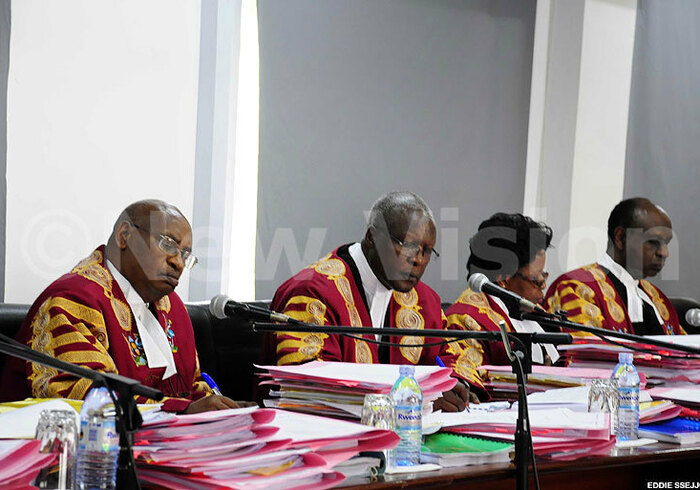
|
4.53pm: 30-MINUTE BREAK
Court takes a half-an-hour break. |
4.50pm: 'Security concerns'
To drill holes into the allegation of social media, Museveni's lawyer Matsiko cites the affidavit of Uganda Communications Commission (UCC) executive director Godfrey Mutabazi which says social platforms were suspended due to security reasons.
In his affidavit, Mutabazi says that Ugandans continued to get updates on election via radio, TV, SMS and others during the period of the social media suspension.
And to block social media, Mutabazi says in his affidavit that UCC was heeded a directive from police boss Gen. Kale Kayihura to block social media over what he called "security concerns".
Chief Justice Bart Katureebe, heading the nine-strong coram, asks whether security threats wouldn't go through other modes of communication like TV or radio [during the social media blockade]?
"I have no evidence on ground in that regard," is Matsiko's response.
4.40pm: Social media
On the allegation that the first and second (Museveni and the Electoral Commission, respectively) ordered that social media be blocked during the polling period, Counsel Matsiko says there's no proof to back that. He adds that there is also no proof that voters were blocked from accessing polling stations with their moobile phones.
4.35pm: Mbabazi's blocking claims
On claims of kidnapping of Mbabazi's agents, Matsiko says that no particulars of the said agents were provided to support the allegation. He also says that no such agent has testified to having been kidnapped.
On the allegations that Mbabazi was blocked from carrying out consultations, Matsiko cites the affidavits of Director of Police Operations Felix Kaweesi and Assistant Commissioner of Police (ASP) James Ruhweza as the respondent's evidence on why Mbabazi was stopped.
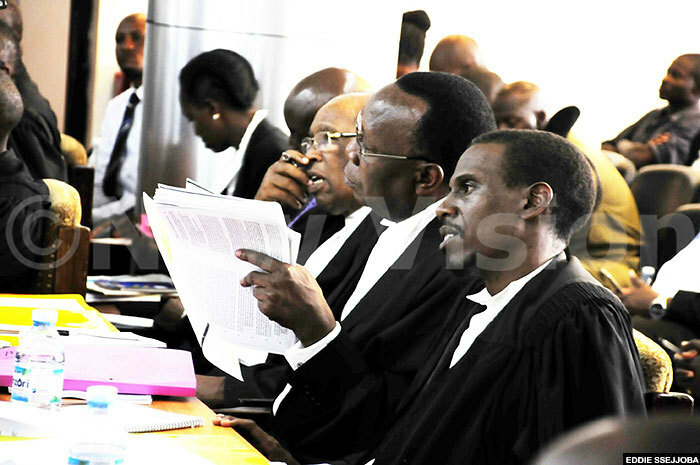
Matsiko argues that Museveni, as the first respondent, has not been shown to have ordered anyone to prevent Mbabazi from carrying out his consultations during the electioneering period.
On ballot stuffing, Matsiko deflates the claim by saying that no-one has come out to say "I was there".
And what about the allegation on campainging on the day of voting (February 18)? Matsiko says just one witness does not lend credibility to the claim.
He defends Museveni against the claim by the petition of breach of the secret ballot. He says there are no particulars from even one polling station where the said breach happened.
4.20pm: The Ntungamo fiasco
On the Ntungamo incident, Matsiko tells the Supreme Cout that those arrested in the clashes that took place there were charged in court in connection with violence and that the criminal case is pending trial.
So as not to compromise any right of appeal for the suspects in that case, Counsel Matsiko asks court not to delve into the case.
4.15pm: The helicopter incident
On the matter of interfering of electioneering activities as claimed by the petitioner particularly the Fort Portal helicopter incident, Museveni's lawyer defends that there is no proof of any disruption or chaos, saying that at the time of the said incident, no rally had started and that it was raining, with only a few people around.
Matsiko calls false allegations that, in the same incident, four men got out of the chopper with "four black bags".
He adds that there is no evidence from the petitioner, Amama Mbabazi, that Museveni gave orders for Mbabazi's rallies to be disrupted.
And what about the claims on intimidation?
Matsiko says such claims are a bare allegation lacking even the slightest of proof.
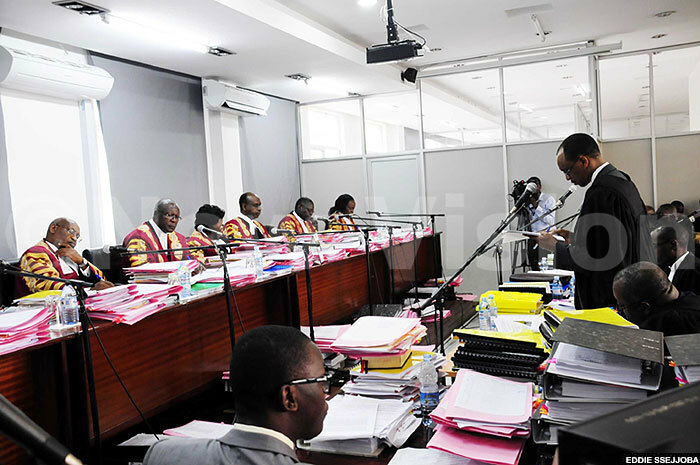
4.07pm: Media coverage
Matsiko tackles the claims of unfair media coverage, particularly by the Uganda Broadcasting Corporation (UBC) TV and New Vision, saying there is no proof that the petitioner pursued equal treatment.
The bench comes in at this point and question whether candidates are required to seek equal coverage or have a right to equal media coverage as by law.
Mastiko uses Vision Group CEO Robert Kabushenga's affidavit in which he says that the petitioner was given front-page coverage of 28% while the respondent has a share of 30.2%.
Yes, the law says that media should give equal coverage of all candidates and the same should be done for their programs, agrees Matsiko. However, a difference of 2.2% media coverage is immaterial, he argues, saying that court should keep in mind that Museveni is the president and would have a little more coverage.
3.50pm: Musisi and Kagina
Matsiko strongly says that neither Kampala Capital City Authority (KCCA) executive director Jenifer Musisi nor Uganda National Roads Authority (UNRA) executive directo Allen Kagina campaigned for Museveni as alleged by the petitioner, Amama Mbabazi.
The lawyer, who is clasping a number of files in this hands, says that basing on his affidavit, Museveni, the first respondent, did not threaten anyone with harm. The allegation of harm to [Christopher] Aine are statements from the petitioner and not evidence, Matsiko tells the Supreme Court
3.40pm: Matsiko: 'No proof'
Lawyer Matsiko is telling court that the petitioner's affidavits do not have evidence that Museveni, the first respondent, was aware of the said bribery acts.
He also throws the spotlight on Peterson Mugasa's affidavit which the lawyer argues that the witness does not provide evidence that he is, to begin with, a voter, and secondly, that he ever met Museveni.
As he builds an electric fence around his submission by punching holes in the affidavits of the petitioner, Counsel Matsiko points out some that have no names or dates.
About the derogatory statement ("leopard's anus") being put forward by the petitioner, Museveni's lawyer says the claim of defamation needs examination of the entire statement. He argues that the statement "leopard's anus" is not treated verbatim.
3.25pm: 'No video footage'
Generally, Counsel Matsiko is questioning the credibility of petitioner Amama Mbabazi's affidavits as he wraps up his submission on matters to do with evidence.
He says that the petitioner does not directly link Museveni to the claims of bribery and so urges court to disregard that submission by the petitioner.
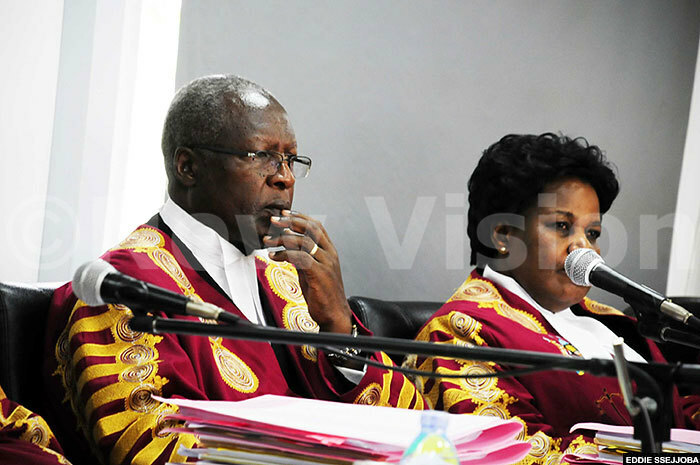
Responding to the sh250,000 alleged by the petitioner to have been given to every village, Matsiko argues that there is no video footage to back the claim.
"I pray that you disregard the evidence in the petitioner's affidavits because of the reasons I have put across," Matsiko urges court, maintaining that there is no evidence that Museveni gave out bribes.
3.15pm: 'No-one was disenfranchised'
Matsiko urges the Supreme Court not to rely on evidence of a deponent who he says admitted in his affidavit to taking a bribe.
"Court should not rely on an uncorroborated affidavit from someone who confesses to bribery in their own statement," he says.
On disenfranchisement, Matsiko argues that the new national voters' register and the biometric voter verification kit(s) did not disenfranchise any Ugandan but instead it was useful in singling out ineligible voters.
He cements the latter argument by pointing out six registered voters, according an affidavit, who were blocked from voting because they were underage.
3.03pm: Wakiso, Kampala stronghold
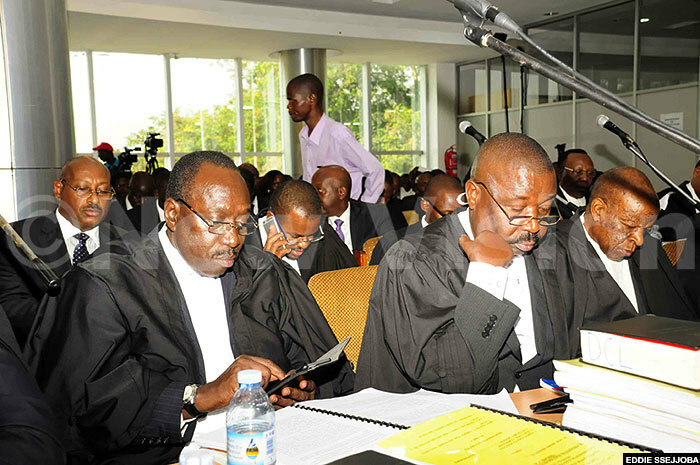
Matsiko is putting up an argument against claims that first respondent Yoweri Museveni has no stronghold in Wakiso and Kampala.
Remember that before going into the lunch time break, the respondent's lawyer argued that Museveni would still have won with 50%-plus votes despite the delays in Wakiso and Kampala.
He says that there is no proof that Museveni had no stronghold in these two areas. He argues, in the 2011 elections, the incumbent won with 49.2% in Wakiso district, and that therefore he has a stronghold there.
2.55pm: Court back in session
Ladies and gentlemen, the Supreme Court is back in session. If you are just joining us here, I will remind you that this is a hearing of an election petition by Amama Mbabazi, who was a candidate in the 2016 presidential race.
Museveni's lawyer, Counsel Joseph Matsiko, carries on with his submission.
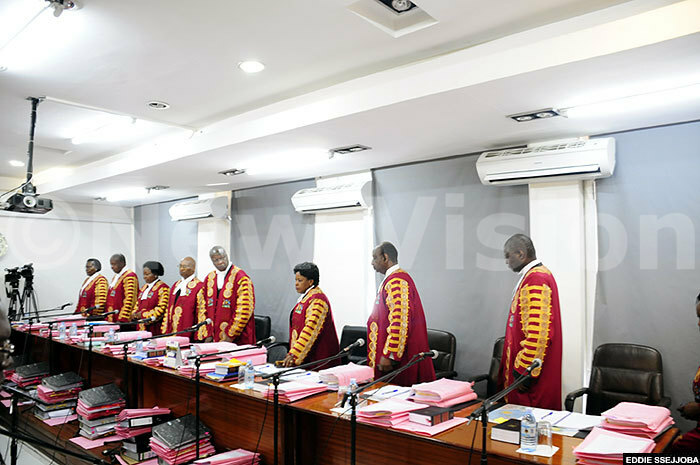
|
2.40pm: WE'RE BACK!
OK gentlemen (in the pictures), enough with the group chatting. Let's get back to the matter at hand . . . 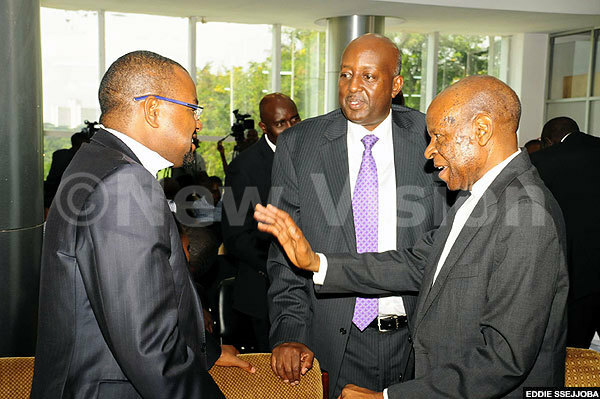
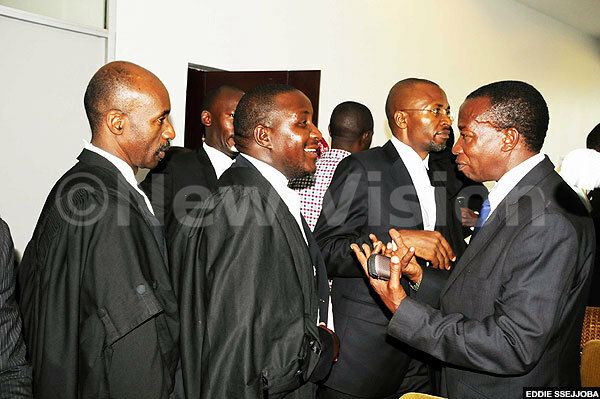
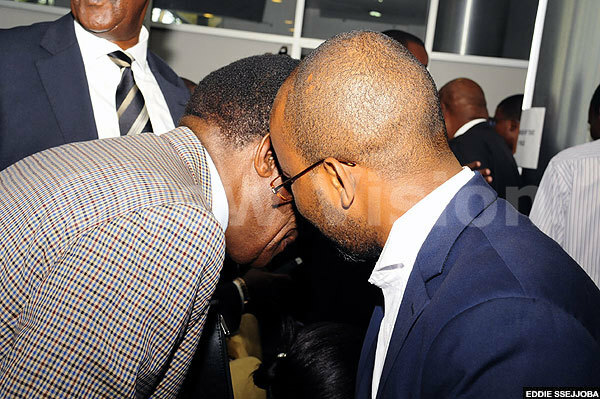
|
|
1.45pm: Roving camera . . .
As you dig into your lunch meal, I decided to do some digging of my own, into some of the best pictures from today's courtroom. Have a look . . . 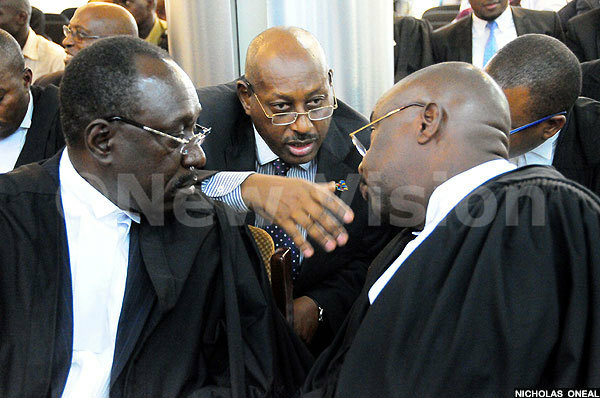 Attorney General Fred Ruhindi (middle) has a word with his deputy, Mwesigwa Rukutana (right).
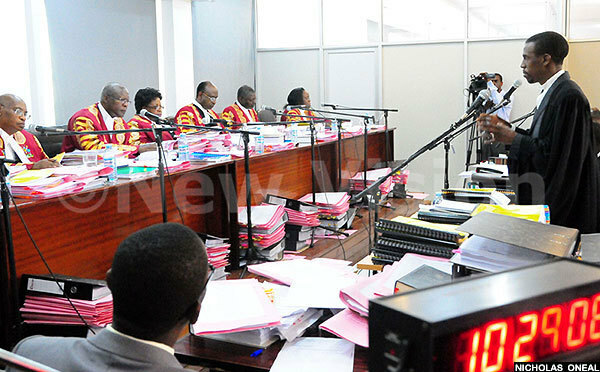 First respondent Museveni's lawyer Kiwanuka Kiryowa giving his submission during a session.
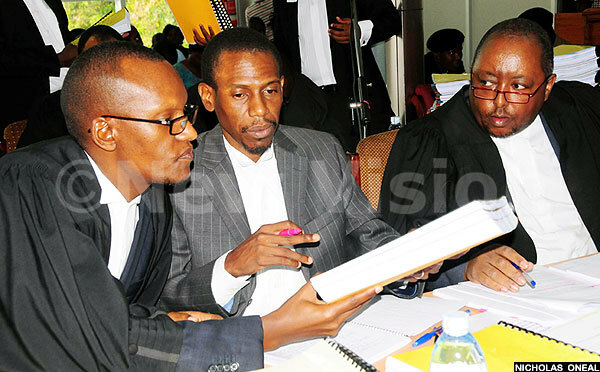 And here, Kiwanuka shares notes with fellow lawyers Edwin Karugire (left) and Didas Nkurunziza before there sbumission.
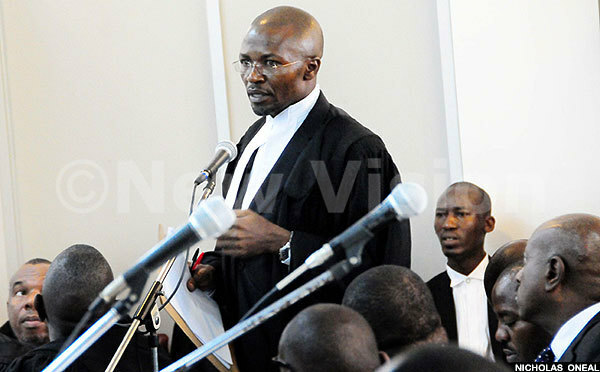 Petitioner Amama Mbabazi's lawyer Severino Twinobusingye responding
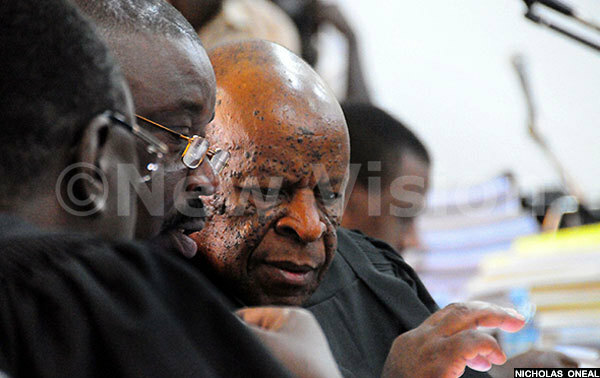 Here, deputy Attorney General Mwesigwa Rukutana chats with Electoral Commission lawyer Macdusman Kabega
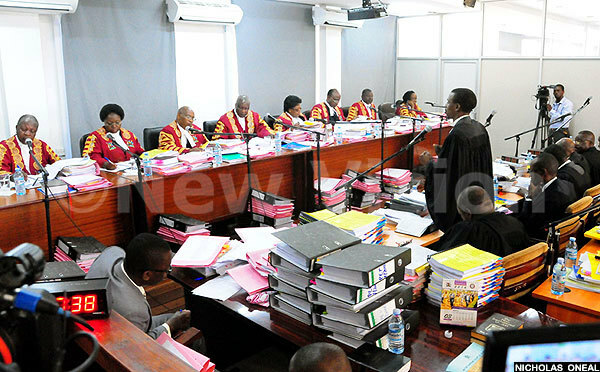
Done with your lunch? You've got half-an-hour to clear your plate. Court returns at 2.30pm.
|
|
1.00pm: LUNCH TIME BREAK
Time for lunch. Court will be back at 2.30pm. 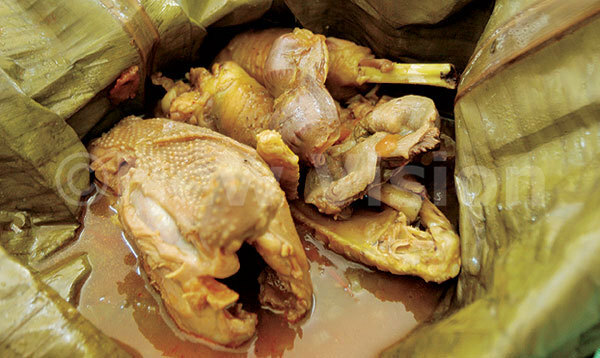
Chicken luwombo. Anyone?
|
12.55pm: 'Museveni would still win'
Electoral Commission chairman Eng. Badru Kiggundu's affidavit indicates that by the time of final declaration of results, 26,223 out of 28,010 polling stations had been tallied. Matsiko says that only 1,787 stations representing 1,051,720 voters had not been tallied by declaration time.
As such he goes on to argue that even if every voter in the areas affected by delays had voted for another candidate, Museveni would still have 50%-plus votes.
12.45pm: 'Two-minute' process
Next, Matsiko tackles a one Duncan Mutogo's affidavit in which the latter says the verification process using the biometric voter verification kit took two minutes during the February 18 elections.
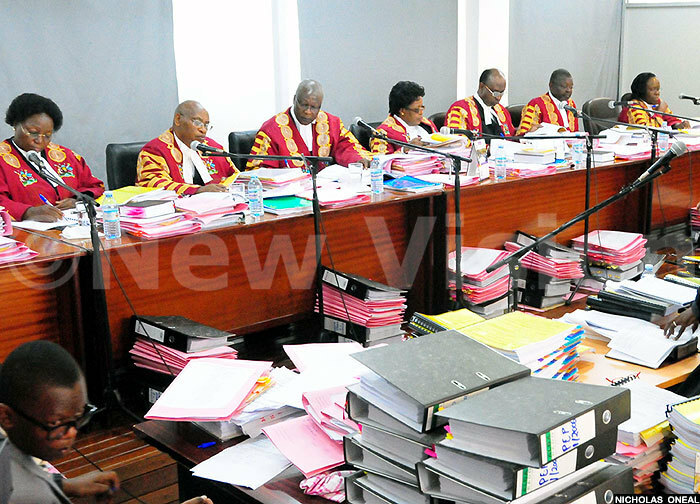
Matsiko argues that Mutogo in his affidavit says that he was nominated by Go Forward to attend training but does not say who organised the training and when the training was conducted.
According to Matsiko submission, Duncan's experience makes him no expert on how the biometric voter verification kit works.
Based on this, Matsiko asks court to consider Mugera's affidavit which indicates that verification takes 30 seconds instead of Duncan's, maintaining that the former is a more credible witness.
12.35pm: Next up: Evidence
First respondent's lawyer Joseph Matsiko takes over. His submission is on the issues relating to evidence.
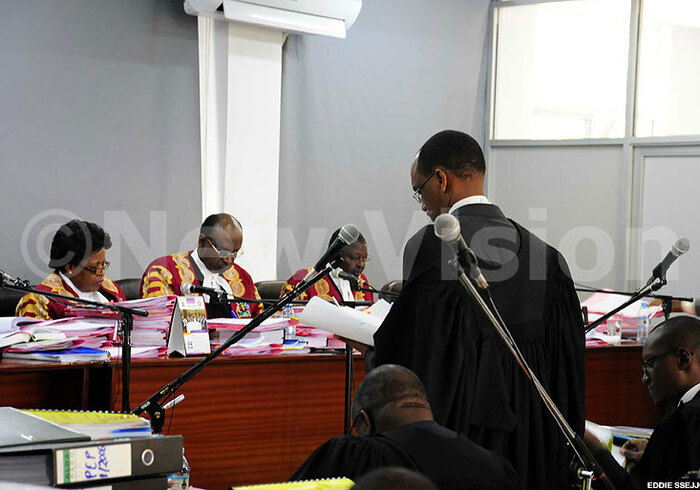
He argues that petitioner Amama Mbabazi's filed evidence is not credible or sufficient to support the claims contained in the amended petition. One of the affidavits filed by the petitioner, he tells court, lacks "probative value".
Matsiko says that the affidavit relied on by the petitioner has inconsistencies and therefore is not credible evidence.
12.30pm: 'Done within law'
In defence of first respondent Yoweri Museveni, Kiwanuka says that the petitioner, Amama Mbabazi, has not brought to court any evidence to support the claim that Mbabazi's results were different from what the Electoral Commission delcared.
He adds that the Electoral Commission gave a copy of the final results to all the eight candidates on February 23, 206.
It is not right enough, the lawyer says, for Amama Mbabazi to come to court and claim the tallying was not transparent because he was not following on a computer. It is our submission that tallying of votes was done transparently in accordance with the law, as by NRM secretary general Justine Lumumba Kasule's affidavit.
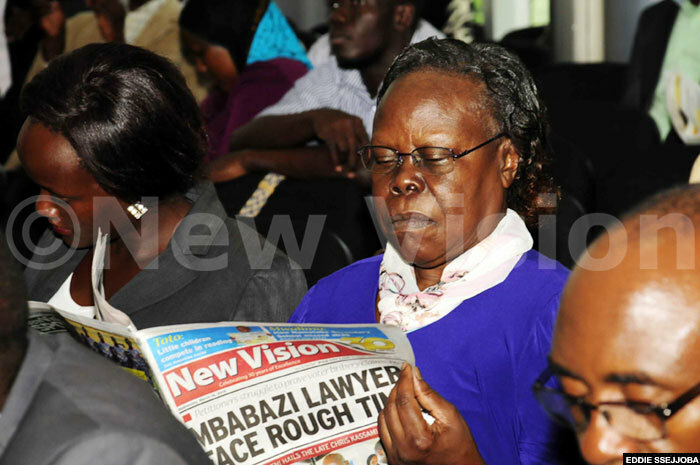
12.15pm: Electronic transmission of results
Kiwanuka argues that it is not the duty of the candidates nor their agents to take part in the transmission of results. That role is for the Electoral Commission. Also, he says that the law does not say that the Electoral Commission will declare the results after receiving the declaration of results (DR) forms but rather to ascertain the results.
So what the petitioner, Amama Mbabazi, should have done is the check on the output at the national tally centre at Namboole, adds Kiwanuka. His submission is that the law does not provide anywhere that the Electoral Commission cannot submit results electronically.
12.05pm: What they say
Some highlights . . .
Electoral Commission lead lawyer Enos Tumusiime: "If the petitioner, Amama Mbabazi, is ready to meet the cost of photocopying, we will provide the DR forms. It requires 616 reams of paper."
Tumusiime: "We have not received any complaint from the petitioner about any missing DR form from the ones they inspected [at the Electoral Commission headquarters in Kampala]."
Chief Justice Bart Katureebe: "Kiggundu said all the scanned copies were on various computers around the country, have they now moved here?"
Petitioner's lead lawyer Mohammed Mbabazi: "We discovered that the DR forms had been sent to court yet they had not served us. These DR forms, are they evidence to court? And who brought them?"
11.50am: 'Did EC tell public?'
The respondent's lawyer goes on to argue that delayed printing of DR (declaration of results) forms for Kampala led to the delay of distribution of materials, to which the nine-strong bench puts him to task to explain why the Electoral Commission did not tell the public so.
If they (Electoral Commission) realized the printing of the DR forms would take longer than planned, why didn't they inform the affected areas early enough, asks Justice Eldad Mwanguhya.
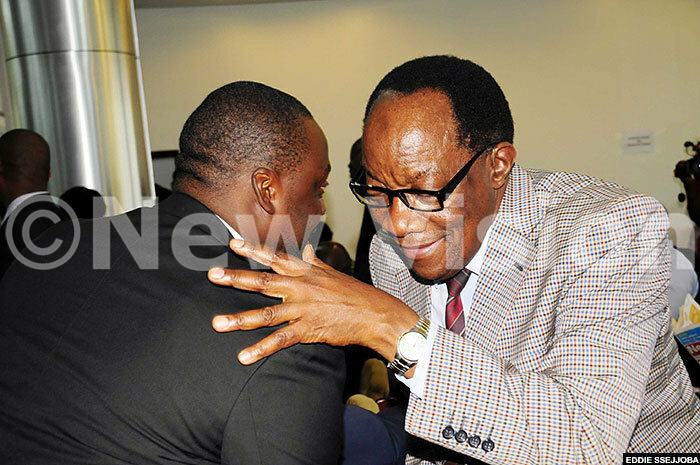
The Electoral Commission, led by Eng Badru Kiggundu, realised it had made a mistake regarding the time of printing of the DR forms and took measures to handle it, argues Kiwanuka, who goes on to say that voting was officially meant to end at 4.00pm local time and was extended to 7.00pm Ugandan time.
The bench asks him whether by 4pm all stations had got polling materials. It is one thing extending the time and another that those stations had received materials, they argue.
Chief Justice Katureebe says that the point of delay of printing of DR forms for Kampala and Wakiso districts is one that needs to be clarified on.
In response, Kiwanuka says that there is no proof suggesting that a voter failed to vote because of the delay of voting materials.
11.40am: Late delivery of voting materials
Back on the mic, this time Kiwanuka is submitting on the issue of late delivery of election materials in particularly Kampala and Wakiso.
He admits that there was late delivery of voting materials in Wakiso and Kampala but stresses that it is not true to say it was intended to benefit Yoweri Museveni.
Accordiong to the polling schedule, the Electoral Commission started the distribution of voting materials with the farthest points, submits Kiwanuka.
|
11.35am: COURT BACK IN SESSION
We are back in the courtroom and the lawyer for President-elect and first respondent Yoweri Museveni, Kiryowa KKiwanuka (pictured here, right, earlier during the brief break), is continuing with his submissions. 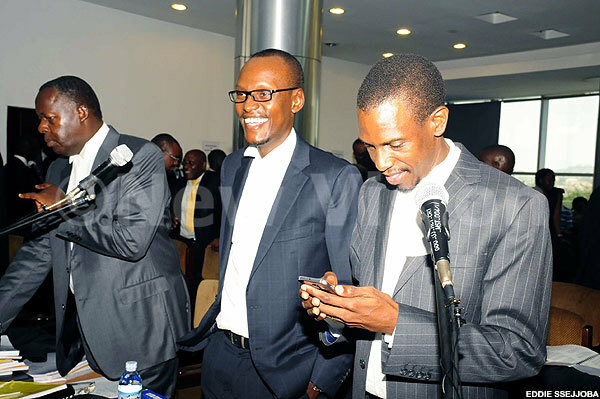
|
11.10am: Flashback
Missed Tuesday's hearing at the Supreme Court. Here's something that should help bring you up to speed . . .
|
10.55am: SHORT BREAK
Court goes for a short break. Time to catch a glass of water. |
10.48am: Disenfranchisement issue
Kiwanuka says that the the national ID data used to compile the national voters' register was compiled by a multi-sectoral party to which the Electoral Commission was a party.
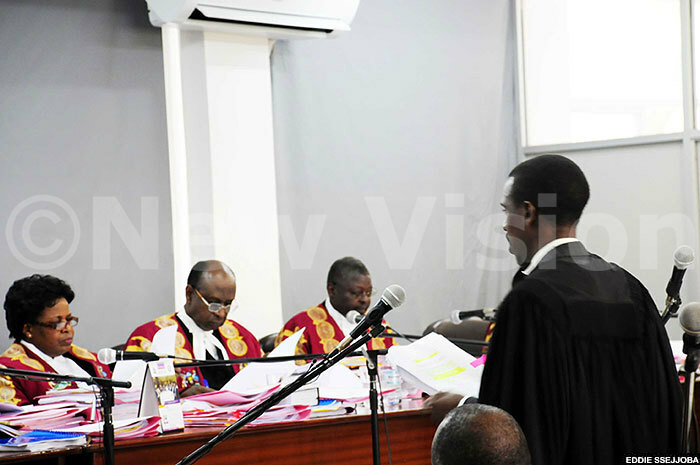
He also uses the law to consolidate his argument, submitting that Section 65 of the Registration of Persons Act gives the Electoral Commission the power to use the national ID information.
On the disenfranchisement point, Kiwanuka argues that Ugandan citizens were abundantly notified to register.
"There's no evidence that anyone was disenfranchised by compilation of a new national voters' register," says Kiwanuka.
"It's not mandatory to issue a voter's card as per Section 26 of the Presidential Elections Act," argues Kiwanuka. He adds that Section 35(3) of the same Act allows one to vote if he or she has no voter's card but can prove their name is on the national voters' register.
He submits that Section 66 of Registration of Persons Act provides for mandatory use of national ID card for identification, adding that the use of national IDs for purposes of identification instead of voter's card did not contravene the law.
On the issue of illegal nomination of Yoweri Museveni by the Electoral Commission, Kiwanuka refers to an affidavit by NRM secretary general Justine Lumumba Kasule in which she says that on November 2, 2015, Museveni was endorsed and the process was completed the following day.
The first respondent, Yoweri Museveni, was endorsed and nominated, submits lawyer Kiwanuka.
10.45am: Voters' register
Kiwanuka is keen to point some of the issues in previous national voters' registers: In 1994, the register was handwritten, in 1996 it had no photographs and in 2001, some photos were ommitted.
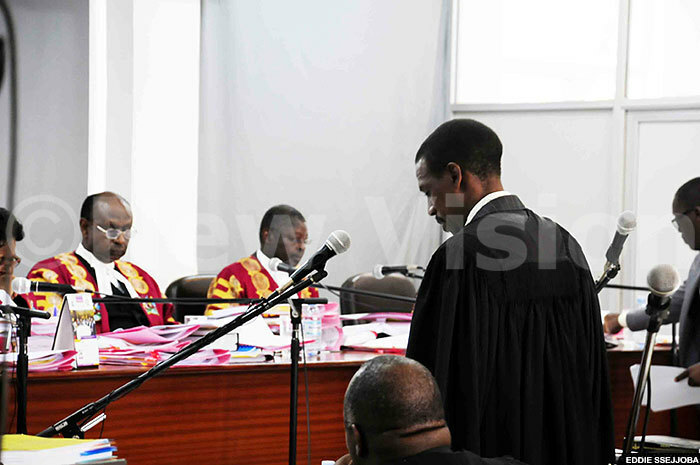
The lawyer's argument is that the Electoral Commission always tries to update the national voters' register to ensure free and fair elections are conducted.
He also points out that down the years, the Electoral Commission has used various ways to compile, maintain and update the voters' register.
10.40am: 'Law not specific'
On the complaint of the national voters' register was compiled illegally and the old one's retiring being illegal, lawyer Kiwanuka Kiryowa refers to the Uganda Constitution, reading that according to Article 61(1a), one of the functions of the Electoral Commission is "to ensure that free and regular elections are held".
As such, argues Kiwanuka, the law is not specific on how the Electoral Commission should "compile, maintain and update" the national Voter's register.
10.30am: Leopard's that-one
Amama Mbabazi's petion alos pins Museveni on use of derogatory language, a claim the first respondent denies.
Lawyer Nkurunziza will read from the Presidential Elections Act: "A candidate will not do the following while campaigning (. . . ). His emphasis is on the word 'campaigning".
So what's with the emphasis?
Nkurunziza argues that the "leopard's anus" statement by Museveni, following the Ntungamo clashes, was not made while Museveni was campaigning. Just so you know, it was made at a press conference.
The first respondent's lawyer also argues that the stament [leopard's anu] was made by Museveni as president and not as a candidate.
The argument by Nkurunzinza as regards this statement is that it was used to illustrate the consequences of one engaging in acts of violence.
10.20am: The sh250,000 per village
On the point of respondent Museveni distributing sh250,000 to all villages in Uganda, Nkurunziza makes reference to Museveni's affidavit.
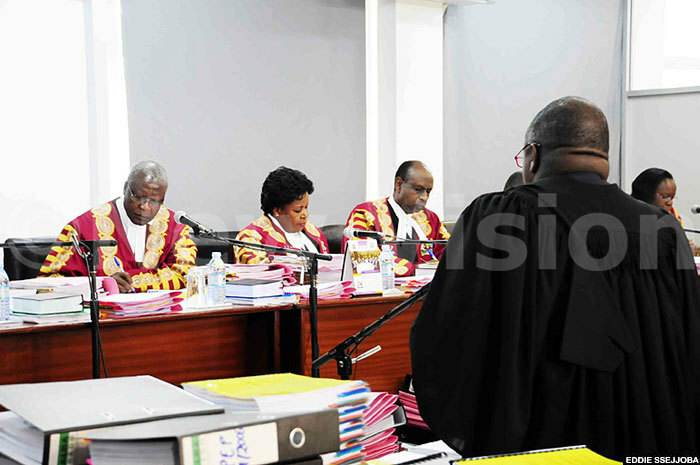
In the affidavit, Museveni says that he did not personally give out sh250,000 to every village "with intent to induce voters to vote for me."
The money was for party (NRM) activities, says the lawyer, adding that no political party can survive without financing its officials.
Also in his affidavit, Museveni denies the allegations of interference. "There is no evidence linking the first respondent to alleged offenses of interference," argues Nkurunziza.
10.10am: 'No evidence'
Nkurunziza tells the Supreme Court that is no evidence that Museveni, who is the first respondent, as candidate, gave out hoes, and that as such, the allegation is not proved.
"There was distribution of hoes, but as part of an ongoing government programme," he says.
10.05am: 'President remains president'
On Tuesday, Mbabazi's lawyer Twinobusingye questioned the status with which Museveni made the hoes pledge, with an argument that the Museveni was a candidate at the time of the statements.
In response, Nkurunziza argues that president remains the president at all times, and that despite the fact he was a candidate, he remained president.
He also argues that in his letter to the Prime Minister, Museveni does say "give the people hoes now" but that he instead mentions "next financial year".
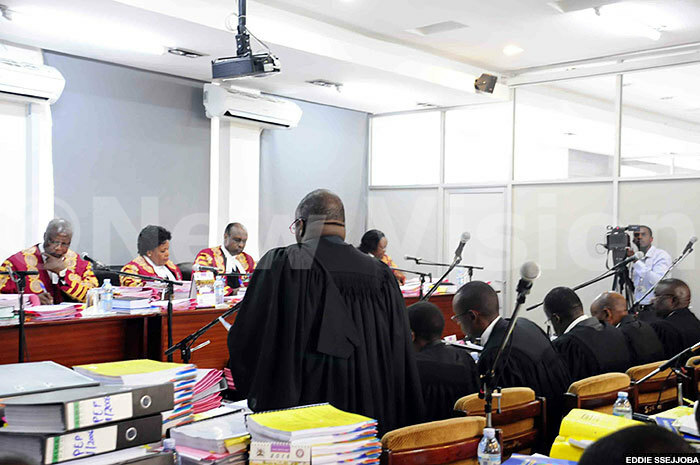
9.55am: The issues at hand
Nkurunziza's task today is to try and punch holes in Mbabazi's petition. He deals with the four offenses stated by the petitioner that includes bribery (hoes issue), organising people to interfere and threatening the petitioner, Amama Mbabazi and his supporters.
Counsel Nkurunziza argues that petitioner failed to provide evidence in relation to the hoes promise. He reads Yoweri Museveni's affidavit in which the president-elect says that "I did not give hoes to people of the West Nile with intent that they vote for me."
On Tuesday, Severino Twinobusingye, the petitioner's lawyer made reference to a letter by the Prime Minister, Dr. Ruhakana Rugunda letter in which he acknowledged Museveni's directive to purchase 18 million hoes.
But according to Museveni's affidavit, he says that the procurement and distribution of hoes was a priority under the Officeof the Prime Minsiter (OPM).
"There was an ongoing government programme for the distribution of hoes with emphasis on northern Uganda," says Nkurunziza, adding that the case the petitioner is making reference to (Terego County) was not a one-off incident.
Also, according to Museveni's affidavit, the then-NRM presidential candidate made no promise for hoes but promised to find out if the distribution was already under way in the area.
9.42am: Petition has 'no merit'
Didas Nkurunziza, leading the team of lawyers reprenting the first respondent, Yoweri Museveni, is up on the mic.
He starts off his submission by saying that former Prime Minister Amama Mbabazi's election petition lacks merit and that they "oppose it" and that court should dismiss it with costs.
On Tuesday, the lawyers of petitioner Mbabazi made their submissions, saying that the February 18 presidential election result that saw NRM Yoweri Museveni declared winner should be annulled.
Missed the proceedings? Check the updates here.
|
9.35am: COURT HEARING BEGINS
The nine judges walk in and take their seats. Court is now in session. 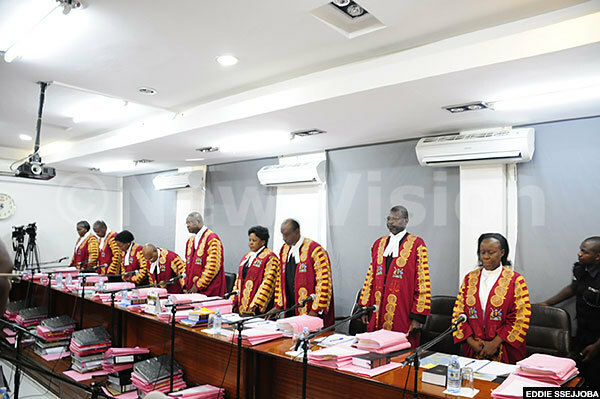
|
9.20am: Let's get started
Hello, hope you have woken up fine this fine Wednesday. A quick check on my calender reminds me that we are half-way into the month.
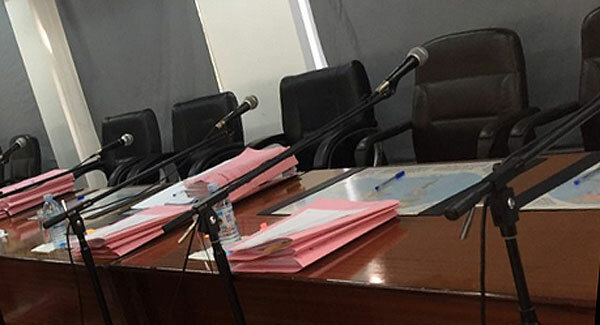
Court has been in the highlight the past couple of days, and it's no different today. Here, we are focusing on the Supreme Court where a hearing of an election petition by former Prime Minister and candidate in the February 18 presidential election.
Good morning and welcome along to this text commentary where I will keep you updated on the happenings in the court today as the respondents present their submissions.